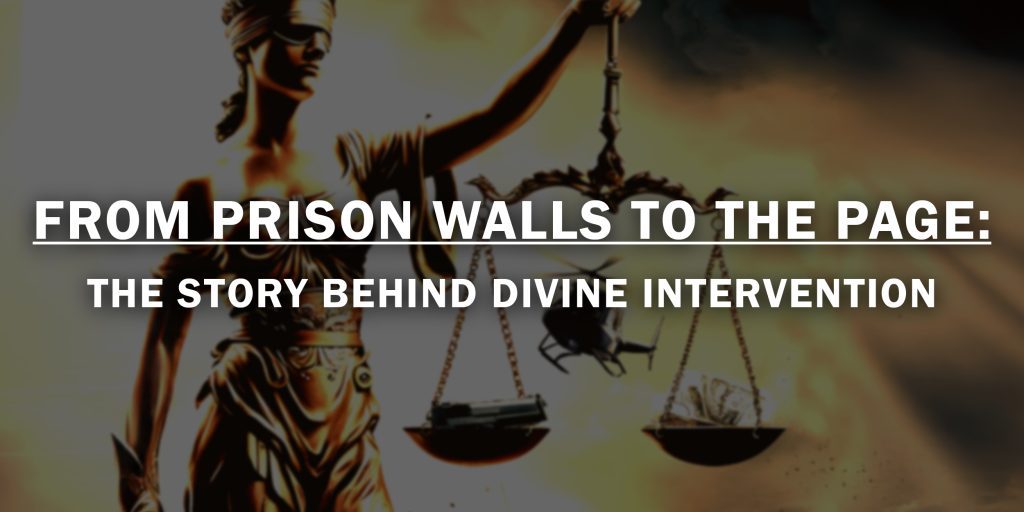
While some stories are crafted from the unvarnished edges of truth, others are the result of imagination. The latter group includes Terry Wilcock’s Divine Intervention, which tells a compelling story of crime, survival, and humanity from behind the harsh walls of a high-security prison. The remarkable journey of Wilcock, a former prisoner who turned his personal hardships into a gritty, realistic work of fiction that appeals to people all over the world, is examined in this blog.
A Life Turned Upside Down
When Terry Wilcock was found guilty of a crime, he maintains he did not commit, his life took a drastic turn. Wilcock, who received a 10-year sentence, spent time in 11 different prisons, giving him a firsthand understanding of the harsh reality of the criminal justice system. Wilcock turned his captivity into a time of creative discovery by directing his energy into writing, something that many people would find depressing.
Wilcock’s firsthand experiences with the underworld, a place where trust is ephemeral, danger is ever-present, and survival necessitates a careful balancing act between bravery and guile, gave rise to the concept for Divine Intervention. In order to give his book a unique realism that distinguishes it from other traditional crime thrillers, Wilcock drew on his personal experiences and insights.
Writing in Confinement
It’s not easy to write in a high-security prison. Wilcock had to deal with many obstacles, such as little resources and the continual distractions of prison life. However, these limitations turned into the furnace that created Divine Intervention. Wilcock was able to devote himself fully to his profession, exploring the nuanced characters and intricate plotlines that make the novel so captivating, because he was not distracted by social media or contemporary conveniences.
Wilcock developed a character who personifies the dichotomy of human nature in Jerry Divine, the protagonist of the book. Jerry navigates a dangerous world where every choice has life-or-death ramifications. He is a vicious criminal and a devoted family person. Wilcock’s deep comprehension of this dichotomy, which he gained from both his personal experience and the accounts of people he met while incarcerated, gives stories a deep, complex depth.
A Window into the Criminal Underworld
Divine Intervention’s uncompromising depiction of the criminal underground is among its most remarkable features. The book gives readers a close-up look into a world that is rarely seen in such graphic detail, from high-stakes drug deals gone wrong to the never-ending game of cat and mouse with police enforcement. Wilcock’s first-hand experiences are the direct source of its genuineness.
Wilcock encountered people whose lives reflected the topics in his book when he was incarcerated. The raw realism of Divine Intervention was derived from their inspiring tales of betrayal, survival, and ephemeral alliances. This is an honest, unvarnished look at the intricacies and inconsistencies of the criminal underworld; it is not a sanitized portrayal.
Turning Personal Pain into Creative Power
Writing Divine Intervention served as a kind of catharsis for Wilcock in addition to being a creative pursuit. He struggled with the unfairness he experienced and the psychological effects of his incarceration, but writing helped him process his own experiences. In many respects, the book is as much about Jerry Divine’s adventures as it is about his own survival.
The book’s emotional depth is evident throughout, especially when it comes to its examination of concepts like trust and loyalty. Jerry’s connections are complicated and tense in a society where treachery might happen at any time. Wilcock’s ability to capture these nuances reflects his own journey of navigating relationships in an environment where trust was often a luxury.
The Blend of Dark Humor and Tension
The way that Divine Intervention skillfully combines dark humor with intense tension is one of its defining characteristics. This distinct tone demonstrates Wilcock’s skill as a storyteller, as he used comedy to counterbalance the somber truths of Jerry’s environment. As a result, the story maintains readers’ attention while incorporating earned and organic moments of humor.
Although striking this equilibrium is difficult, Wilcock does so deftly. His capacity to find humor amid the direst circumstances is a testament to his fortitude and outlook, which surely enabled him to weather his own tribulations.
From Prisoner to Published Author
The publication of Divine Intervention is a triumph not just for Wilcock, but also for anyone who believes in the transformative power of storytelling. His journey from prisoner to published author serves as a powerful reminder that even in the darkest circumstances, creativity and determination can pave the way for redemption and renewal.
Wilcock’s success also challenges societal perceptions of former prisoners. By sharing his story and his work, he demonstrates that individuals with criminal records can contribute meaningfully to society, using their experiences to create art that informs, entertains, and inspires.
A Testament to Resilience
Divine Intervention is more than just a crime thriller; it is a testament to the resilience of the human spirit. Through his writing, Terry Wilcock not only overcame the challenges of incarceration but also found a way to share his truth with the world. His journey is a powerful example of how creativity can thrive even in the most unlikely places, turning pain into purpose and adversity into art.
As readers dive into the pages of Divine Intervention, they are not just experiencing a gripping story—they are witnessing the remarkable journey of a man who refused to let his circumstances define him. For anyone seeking a tale of survival, transformation, and the indomitable power of the human spirit, Terry Wilcock’s story is one that will resonate long after the final page is turned.
